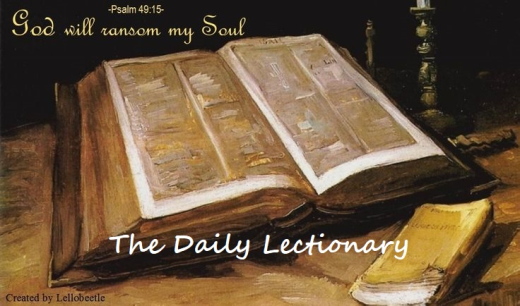The Daily Lectionary
MONDAY, April 20, 2020
(Revised Common Lectionary Year A)
God saves through water
1 When Israel came out of Egypt,
Jacob from a people of foreign tongue,
2 Judah became God’s sanctuary,
Israel his dominion.
3 The sea looked and fled,
the Jordan turned back;
4 the mountains leaped like rams,
the hills like lambs.
5 Why was it, sea, that you fled?
Why, Jordan, did you turn back?
6 Why, mountains, did you leap like rams,
you hills, like lambs?
7 Tremble, earth, at the presence of the Lord,
at the presence of the God of Jacob,
8 who turned the rock into a pool,
the hard rock into springs of water.
Gideon and the fleece
6:36 Gideon said to God, “If you will save Israel by my hand as you have promised— 37 look, I will place a wool fleece on the threshing floor. If there is dew only on the fleece and all the ground is dry, then I will know that you will save Israel by my hand, as you said.” 38 And that is what happened. Gideon rose early the next day; he squeezed the fleece and wrung out the dew—a bowlful of water.
39 Then Gideon said to God, “Do not be angry with me. Let me make just one more request. Allow me one more test with the fleece, but this time make the fleece dry and let the ground be covered with dew.” 40 That night God did so. Only the fleece was dry; all the ground was covered with dew.
Paul teaches the resurrection
15:12 But if it is preached that Christ has been raised from the dead, how can some of you say that there is no resurrection of the dead? 13 If there is no resurrection of the dead, then not even Christ has been raised. 14 And if Christ has not been raised, our preaching is useless and so is your faith. 15 More than that, we are then found to be false witnesses about God, for we have testified about God that he raised Christ from the dead. But he did not raise him if in fact the dead are not raised. 16 For if the dead are not raised, then Christ has not been raised either. 17 And if Christ has not been raised, your faith is futile; you are still in your sins. 18 Then those also who have fallen asleep in Christ are lost. 19 If only for this life we have hope in Christ, we are of all people most to be pitied.
20 But Christ has indeed been raised from the dead, the firstfruits of those who have fallen asleep.
Optional parts of the readings are set off in [square brackets.]
The Bible texts of the Old Testament, Epistle, and Gospel lessons are from The Holy Bible, New International Version®, NIV® Copyright ©1973, 1978, 1984, 2011 by Biblica, Inc.® Used by permission. All rights reserved worldwide.
The Daily Lectionary is a three-year cyclical lectionary. We are currently in Year A. Beginning with the first Sunday of Advent in 2020, we will be in Year B. The year which ended at Advent 2019 was Year C. These readings complement the Sunday and festival readings: Thursday through Saturday readings help prepare the reader for the Sunday ahead; Monday through Wednesday readings help the reader reflect and digest what they heard in worship. Revised Common Lectionary Daily Readings, copyright © 2005 Consultation on Common Texts. www.commontexts.org
The Daily Lectionary for MONDAY, April 20, 2020
Psalm 114; Judges 6:36-40; 1 Corinthians 15:12-20









